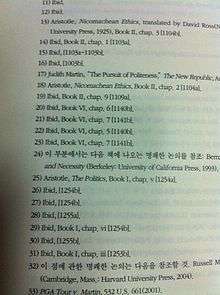Ibid.
Ibid. is an abbreviation for the Latin word ibīdem, meaning "in the same place", commonly used in an endnote, footnote, bibliography citation, or scholarly reference to refer to the source cited in the preceding note or list item. This is similar to Idem, literally meaning "the same", abbreviated id., which is commonly used in legal citation.[1]

Ibid. may also be used in the Harvard (name-date) system for in-text references where there has been a close previous citation from the same source material.[2][3] The previous reference should be immediately visible, e.g. within the same paragraph or page.
Some academic publishers now prefer that "ibid." not be italicized, as it is a commonly found term.[4] Since ibid. is an abbreviation where the last two letters of the word are omitted, it takes a full stop (period) in both British and American usage.
Example
- [1] E. Vijh, Latin for Dummies (New York: Academic, 1997), 23.
- [2] Ibid.
- [3] Ibid., 29.
- [4] A. Alhazred, The Necronomicon (Petrus de Dacia, 1994).
- [5] Ibid. 1, 34.
Reference 2 is the same as reference 1: E. Vijh, Latin for Dummies on page 23, whereas reference 3 refers to the same work but at a different location, namely page 29. Intervening entries require a reference to the original citation in the form Ibid. <citation #>, as in reference 5.
Cultural references
- Ibid. is used in the 1960s play Who's Afraid of Virginia Woolf? by Edward Albee. Albee uses an unabbreviated ibid in his stage directions to tell an actor to use the same tone as the previous line.
- In the 1989 book Pyramids by Terry Pratchett, one of the Ephebian philosophers is called "Ibid".
- In the 1997 movie Good Will Hunting, the main character, Will Hunting, when arguing for himself in court against the dismissive rebuttals of the prosecuting attorney, cites obscure case law, then follows up by stating "Ibid, your Honor."
See also
References
- "Idem". thefreedictionary.com. Retrieved 11 May 2008.
- Chicago Manual of Style Online, (13.64).
- New Hart's Rules, Oxford University Press, 2005, p.396
- E.g., "Style sheet: Cambridge University Press" (DOC). 2013.